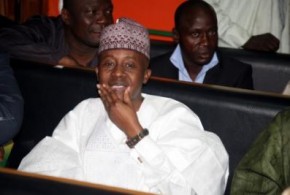
The trial of a former member of the House of Representatives, Farouk Lawan, over allegations that he received $620,000 bribe from oil magnate Femi Otedola, resumed Tuesday at an Abuja High Court, with Mr. Lawan’s co-accused turning against the former lawmaker as the key prosecution witness.
Mr. Lawan also lost an all his applications before the court on Tuesday.
The former lawmaker chaired a House committee that investigated a multibillion fraud associated with government fuel subsidy. He allegedly received bribe from Mr. Otedola, to exclude his firm from the list of indicted companies.
Mr. Lawan was first arraigned in 2012 alongside the secretary of the House ad hoc committee, Boniface Emenalo.
But docked before Justice Angela Otaluka of the FCT High Court, Lugbe, on Tuesday, Mr. Lawan was informed of fresh amended charges against him alone.
Mr. Emenalo, who was a co-accused served as the main prosecution witness for the Independent Corrupt Practices and other matters Commission, ICPC.
Sources at the commission revealed that a deal was reached with Mr. Emenalo to serve as prosecution witness for his charges to be dropped
The duo were formerly facing a seven-count charge of bribery, an offense that violates Section 10 (a) (ii) of ICPC Act, 2000 and punishable under Section 10 of the same Act.
They were alleged to have conspired in April 2012 to demand $3 million gratification from Mr Otedola.
In the original charge, Mr. Emenalo was accused of collecting $120,000, while Mr. Lawal received $500,000.
The new charge read Tuesday, accused only Mr. Lawan of receiving $500,000.
Before, the trial began, the counsel for Mr. Lawan, Sekop Zumka, told the court of the application before it challenging its jurisdiction based on the amended charges.
“Jurisdiction is fundamental to any criminal proceedings especially where the defendant is ready and willing to defend the charge against him,” he said.
Mr. Zumka asked the court to set down the motion for hearing which was filed on January 28, 2016.
Dismissing the application, Justice Angela Otaluka cited extant laws of procedure of Criminal Justice Act (CJA) 2015 and stated that amendments made to the charges were meant to ensure speedy dispensation of justice to all parties.
She said Mr. Lawan was standing trial in a court of the Federal Capital Territory and was being prosecuted by a Federal Government Agency, the ICPC, which was a creation of an Act of the National Assembly.
The judge ruled that the plea made by the defendant could only be considered when the court was heading to judgment stage.
Another loss suffered by Mr. Lawan and his team was the oral application by Mr. Zumka to adjourn the commencement of hearing to Wednesday February 3.
Mr. Zumka based his application on the fact that the lead counsel, Ricky Tarfa, and co-lead counsel, Mike Ozekhome, both Senior Advocates of Nigeria, who were absent in court, were “both interested in taking the trial personally”.
He also stated that even the prosecution counsel, Awomolo, who is also a Senior Advocate “would prefer to face an equal match”. The lawyer said the two lead counsel were not in court based on the assumption that trial would not commence Tuesday since there was an application challenging the jurisdiction of the court.
“He also said it was only “fair that the defendant, who hired the services of Senior Advocates is allowed to enjoy their services,” Mr. Zumka assured that the request to adjourn commencement of trial was not intended to delay prosecution in anyway.
The prosecution counsel, Adegboyega Awomolo, objected to the application arguing that Mr. Zumka had earlier introduced himself as a counsel to the defendant “not holding brief for anyone”.
He also said all counsel on the matter were aware of the commencement of trial over 30 days ago. He said the prosecution had brought in witnesses “everywhere”.
Justice Otaluko, agreed with the prosecution and ruled that trial should commence immediately.
She said there was nothing before her to show that all counsel who should have been in court were not round for any admissible reasons.
Following the ruling, the prosecution called its first witness, Mr. Emenalo, to the stand and Mr. Awomolo asked him to identify a document, which was a subpoena to the Clerk of the House of Representatives asking him to release some official documents in his possession to the plaintiff, the ICPC.
When Mr. Emenalo identified the subpoena, Mr. Awomolo sought to tender it as evidence before the court. The defence counsel however, objected to its admissibility.
The prosecution thereafter submitted seven documents which were also identified by the witness, Mr. Emenalo, as order paper for a special session of the House of Representatives which held on Sunday January 8, 2012, the votes and proceedings of the special session, also dated Sunday January 8, 2012 and another Order Paper of the sitting of the House of Representatives which held on Wednesday 18 April 2012.
Other documents identified by Mr. Emenalo include the votes and proceedings of Wednesday 18 April, 2012 as well as an Order Paper of the sitting of the House on Tuesday, April 24, 2012; the votes and proceedings of the sitting of April 24 and a report of the House of Representatives ad hoc committee set up to verify and determine the actual subsidy requirement and monitor the implementation of the subsidy regime in Nigeria.
Justice Otaluka agreed with the prosecution and admitted all seven documents and marked them as evidence.
Citing Section 104 of the Evidence Act, Justice Otaluka said the documents are all relevant to the criminal trial and thereby admitted as evidence.
The judge however ordered the prosecution to make payments for certification of the documents within seven days.
She then adjourned the matter to Tuesday January 9 for the prosecution to continue its cross examination of its first witness, Mr. Emenalo.
Premium Times
Leave a Reply